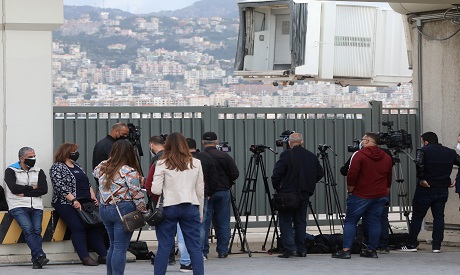
Journalists are pictured at Beirut International Airport before the arrival of the first batch of doses of the Pfizer/BioNTech vaccine against the coronavirus disease (COVID-19), in Beirut, Lebanon February 13, 2021. (Photo: Reuters)
As Lebanon prepared to receive its first COVID-19 vaccines on Saturday, the World Bank said it would closely monitor the inoculation campaign that it has helped finance to ensure the shots go to those most in need.
Lebanese hospitals, which have been hammered over the past year by an acute financial crisis and a massive explosion in the capital, have also faced some of the region's highest coronavirus infection rates.
In its first operation funding the purchase of COVID-19 vaccines, the World Bank reallocated $34 million from an existing health project in Lebanon to help the country finance its vaccination drive.
"We will MONITOR fair and transparent distribution to PRIORITY groups," Ferid Belhaj, the lender's regional vice president for MENA, wrote in a tweet overnight. He said that included health workers and people aged over 65.
The bank said it had signed an agreement for the Red Cross to oversee monitoring.
Lebanon's Health Ministry has said it has secured about 2.1 million supplies of Pfizer-BioNTech's COVID-19 vaccine to arrive in stages throughout the year. The first batch, about 28,000 doses, was due to land at Beirut airport on Saturday.
Lebanon has also booked 2.7 million doses through the global COVAX scheme for poorer countries.
Officials have said talks are ongoing for some 1.5 million doses of AstraZeneca's vaccine, which would mean the country has ordered shots for about half of its population of more than six million, which includes at least a million Syrian refugees.
Firass Abiad, head of Rafik Hariri hospital, Beirut's largest public coronavirus facility, said its medical staff would get their shots within 24 hours.
"The best gift one can ask for on Valentine's day," he said on Twitter on Saturday.
Nearly a month into a strict lockdown, the government began easing some restrictions this week. Most businesses are closed and a 24-hour curfew remains in effect.
As several countries in the region began rolling out vaccines, a COVID-19 surge flooded Lebanese hospitals after lax measures during Christmas, taking the nation's total death toll to almost 4,000.
Many ICU wards filled up, as shortages of dollars and medical supplies spawned a black market for oxygen tanks.
Short link: